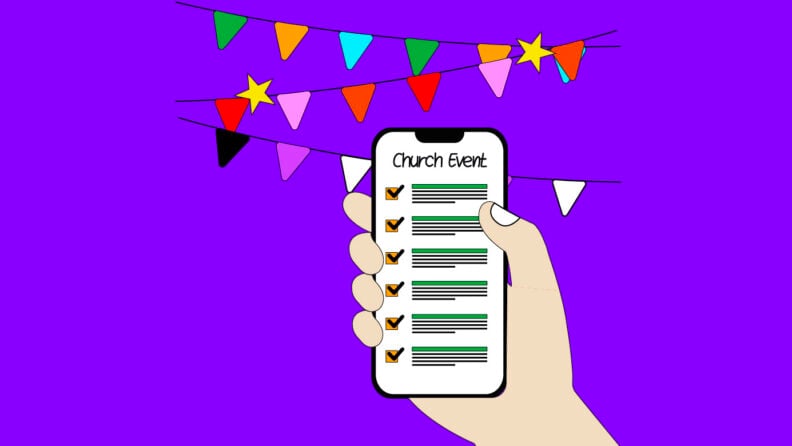So, you have decided to host a church conference, and now, on top of all the other hats you wear to run a church, you’re adding “conference planner” to the mix. I can hear the question: how do I organize a church event? Not only that, but...
- How can I find enough reliable volunteers?
- How do I plan a quality conference without going over budget?
- How do I keep track of all the logistics, like scheduling speakers and organizing meals?
- How can I make sure enough people attend the conference and that we reach our attendance goals?
And, maybe… what have I gotten myself into? Trust me, I’ve been there. Having planned my fair share of church conference weekends, I totally understand how daunting it can feel. But here is the good news:
With some planning and trusty church management software to keep you on track, you will get the hang of it in no time. And honestly, after you make it through the first one, you might even enjoy the process!
What Is A Church Conference (And When Planning One Good Idea?)
Maybe when you hear the word “conference,” your mind drifts to dry discussions and boring topics—but trust me, a church conference can be so much more! It’s not just another event; it’s an incredible opportunity for growth, both for the church as a whole and for the individuals within it.
And if you can believe it – It can also be fun! I know for my church, our weekend conference together is always the highlight of the year!
Whether it’s a one-day event or a weekend retreat, the best part of a church conference is that it brings the church family together for a dedicated time of worship, teaching, and connection—with God and with each other.
Church conferences represent a chance for pastors to dive deep into important areas like discipleship, leadership, or worship. If you’re looking to ignite spiritual growth in your church family or provide a time of refreshing, a church conference can offer the perfect kickstart to create that momentum.

So, when is it a good idea?
Consider your church’s current season. Are you looking to grow your community or strengthen relationships within your congregation? A conference can be just the highlight you need - a pivotal event on the church calendar. It's a great opportunity to:
- Connect with new members
- Deepen friendships among existing members
- Re-cast your church’s vision
- Reinforce your church's mission.
Whether you are focused on discipleship, leadership development or building community, the right conference enhances the spiritual growth you are looking for!
Before I get into the nitty gritty of how to organize a church conference, let's break apart the different types of conferences:
| Conference Type | Description | Best Use Case |
|---|---|---|
| Technology Conference | Focuses on leveraging technology for ministry, covering areas like media, live streaming, sound systems, and tech tools for outreach. | Best for churches looking to modernize their tech infrastructure, improve their online presence, or train tech teams. |
| Worship Conference | For worship teams, sessions focus on skill development, theology, creative expression, etc. | For worship teams, sessions focus on skill development, theology, creative expression, church worship team auditions, etc. |
| Leadership conference | Focuses on developing leadership skills, casting vision, team building, and spiritual leadership | Ideal for churches wanting to raise up strong leaders, empower their serving teams, and strengthen leadership dynamics. |
| Youth Conference | Targets teenagers and young adults, with a mix of fun activities, worship, teaching, and discipleship. | Perfect for churches wanting to engage youth, foster discipleship, and encourage faith development in young people. |
| Church Family Conference/Camp | A relaxed gathering with no specific focus other than worship, learning, and deepening relationships with each other and God. | Perfect for churches wanting to create a time of unity and connection, while nurturing spiritual and relational growth. |
How Plan An Awesome Church Conference (8 Critical Steps)
While planning a niche conference can be a good idea, I will keep things simple and focus on giving you steps eight steps for planning and organizing a successful church conference.
Step 1: Define Chuch Conference Goals And Theme
- Clarify the purpose: Start by identifying the main goal of your conference. Even if you are just aiming to build a stronger church community, having a clear objective will shape everything else - from choosing the speakers to planning the activities!
- Choose a resonant theme: Select a theme that aligns with your church's current needs and vision. A theme that resonates will not only excite the attendees but also give your event a clear sense of direction.
- Unify the event: A clear, focused theme helps unify the conference and communicate its purpose effectively to attendees.
- Avoid broad or vague themes: Ensure your theme is specific and clear, as overly broad themes can dilute the impact of the event, and lack focus. A strong theme will make your church conference more impactful and leave a lasting impression.

Take a look at some examples below of what I mean:
| Vague/ Theme Ideas: | Improved Version |
|---|---|
| Faith | Renewed Vision: Rekindling Our Purpose |
| Christian Living | Deepening Discipleship: Walking Closer with Christ |
| God's Plan | Unity in Community: Strengthening Our Church Family |
| Love | Leadership in Action: Empowering the Next Generation |
| Growth | Worship Unleashed: Encountering God Together |
| Worship | Faith & Culture: Engaging the World with the Gospel |
| Spirituality | Rooted in Christ: Building a Firm Foundation |
| Fellowship | Living Generously: Stewardship & Service |
| Transformation | Courageous Faith: Boldly Following God’s Call |
| Ministry | Hope for Tomorrow: Embracing God’s Plan for the Future |
Let’s be clear—there’s nothing wrong with a conference theme of faith. After all, faith is at the heart of the Christian walk! But without a little extra context, it’s just too broad. A theme like that won’t give your speakers or attendees a clear direction, leaving them wondering what the main focus is supposed to be and why they are there.
Step 2: Lockdown The Dream Team!
Now that your theme is set, it’s time to recruit your church event planning team and lock in the key people who will make organizing a church conference a success.
Start by assembling a team of dedicated members to handle different tasks. Use a planning checklist to assign roles like:
- Event Coordinator
- Logistics Coordinator
- Communications Coordinator
These roles will keep everyone organized and on the same page!
Next, focus on securing key speakers and worship leaders who align with your vision. If you’re using your own staff or worship team, start conversations early to give them time to prepare and pray into the event.
The organizational team shapes the entire conference, so ensure they’re connected to the vision and praying over it!
And don’t forget to factor in your event budget while recruiting. Building a strong team is essential, especially for a first-time event. With the right team members in place, your conference will be well-organized, impactful, and set for success!
Be Careful of:
- Waiting too long to secure the team: Speakers and worship leaders book up quickly, so delaying could leave you with limited options or a team that doesn’t align with your theme.
- Not clarifying expectations: Communicate clearly—whether it’s the message content, time commitment, or rehearsal schedule. Miscommunication can lead to awkward moments or misalignment.
- Overloading your team: It’s tempting to have your trusted team handle everything, but too many tasks can lead to burnout. Ensure they have enough support to deliver their best.
- Ignoring backup plans: Always have a backup speaker or leader in case of last-minute cancellations.
Step 3: Draft The Schedule!
At this stage of organizing a church conference, it might seem early to start drafting the schedule but trust me—getting this done now will make it easier to plan for volunteers and venue setup down the road.
Balance is key.
Create a schedule that mixes teaching, worship, and some fun! Don't forget meal times and breaks to keep everyone energized!
Add Variety.
Spice things up with interactive workshops, breakout groups, or activities to keep the engagement high.
Plan around your attendees!
If families with younger kids are attending, plan around nap times or early bedtimes.
Be Careful of:
- Overpacking the Schedule: Cramming too many activities can overwhelm attendees. Ensure there’s time for rest and connection—important for church members and families.
- Not Considering Your Audience: A schedule that doesn’t address specific needs (like young kids or older adults) can lead to frustration.
- Skipping Time Buffers: Delays are inevitable. A tight schedule can derail everything, so include buffer time between sessions to keep on track.

Step 4: Choose The Right Venue
Selecting a venue that matches your needs is crucial. Consider these key elements when finding a venue:
- Location: Is it easy for everyone to get to?
- Capacity: Can it comfortably hold your expected group?
- Accessibility: Is the venue accessible for all attendees?
- Amenities: Does it have the necessary facilities, Like breakout rooms or AV equipment?
Book early to secure your dates, and don't hesitate to visit the venue in person to ensure everything meets your needs. Plan to visit your venue multiple times beforehand! It's amazing what things you miss the first time through a new space.
As you finalize details, unexpected things will pop up-you don't want to discover on the day of the event that the main room only has one power outlet! It's not fun.
If you are booking a venue like a bible camp for a weekend conference, take note of things:
- Is the auditorium big enough for your sessions?
- Are the cabin rooms….fully equipped with doors? (this actually happened to us once, and let's just say it didn't go down well)
- Are the breakout spaces suitable?
- Can the kitchen staff handle meals for your group size?
- What's the parking situation?
Step 5: Build An Epic Volunteer Team
A strong volunteer team is a huge part of organizing a church conference. Your team is crucial in ensuring your church conference runs smoothly. Assign clear roles to cover all areas of the event. Make sure to provide thorough instructions and training so that your volunteers feel confident in their responsibilities. Great volunteers will significantly enhance the overall conference experience!
Sometimes there are volunteer roles that are needed many don't even think about until you realize they are needed! Here are some key roles that might not be super obvious, but is super helpful to have, of course you can tailor to fit your need:
A Prayer Team
You need folks dedicated to praying for the event, speakers, and attendees leading up to the event. They should also be available at the event for people who want specific prayer.
Tech Troubleshooter
Recruit a “go-to” person who can be the one person people can call on for some quick fixes that might be needed for AV equipment or sound issues that might arise.
Transportation Coordinator
This role is more important than you might think! It’s great to have someone who organizes shuttles, carpools, and transportation—not just for out-of-town guests and speakers but also for attendees who need a ride. Not everyone drives, and having a dedicated person to connect them with available drivers or carpool options can make a big difference for newer or non-driving members.
A Childcare Team
Create a team to manage childcare during the services and breakout sessions. This is an opportunity to not only bless the parents and guardians of kids, but to deeply invest in the lives of those Jesus prized.
Set up/Tear Down Crew
Gather a team specifically tasked with setting up chairs, tables, and equipment before and after sessions.
A First Aid Attendant
You never know when surprise medical incidents might occur. Having someone in your church identified - like a nurse or doctor, or even someone certified can be invaluable! They can still attend and enjoy the conference but their presence as a back up will be a massive benefit!
Your Hospitality Crew
Whether your conference is at a church camp where meals are provided or at a different venue, having a hospitality team will be a huge help! They’ll keep the coffee and tea flowing, and snacks ready during break sessions. This not only saves time by keeping people from leaving to grab drinks, but also encourages attendees to stay on-site and connect with each other—which is a big focus of the conference!
Be careful of:
- Underestimating the Number of Volunteers: Not enough volunteers will overwhelm and possibly burn out your team, which will not only leave important tasks forgotten but also lower the quality of the conference.
- Bad Communication: Ensure expectations and roles are clearly communicated. You don’t want tasks to be overlooked or confusion to arise—be very specific about each volunteer's responsibilities. Never assume people will automatically know what’s expected of them!
- Skipping Training: Never skip proper training! Ensure every volunteer knows the schedule, where essential areas (like washrooms and emergency exits are), and understands their specific tasks. For example, does the tech team actually know how to run the sound system? Can the hospitality crew handle the coffee maker? Unprepared volunteers can cause unintentional delays. Proper training isn't just about efficiency, it's also showing care to your team by setting them up for success!

Step 6: Promotion Time!
When you feel you have the basic details figured out like dates and speakers and venue, you can start promoting! Use various channels like church emails, your church website, social media, or church bulletin.
Create engaging content that showcases the conference's value and encourages early registration. Offering early bird discounts or group rates can also help boost attendance.
Be careful of:
- Over-promising: Avoid exaggerating in your marketing. Don't show a huge venue with thousands of people when you know that you will get a few hundred people. Likewise, don't show pictures of lavish dinners if you are really only serving crackers and cheese. If the reality doesn't match the expectations, it can lead to disappointment and dissatisfaction.
- Neglecting Small Details: Even if it’s a small conference, don’t overlook details like clear event information and easy registration. These small touches can make a big difference.
- Underestimating Reach Even smaller churches can benefit from a broad promotional strategy. Don’t limit your reach by sticking to just one or two channels
Step 7: Check, Check, And Double Check
Okay, I admit it—I drive my husband a little crazy with my constant double-checking. But, after years of experience, I’ve learned that when working with people, mistakes are inevitable. And while I’d love to be a “fountain of grace,”a church conference weekend isn’t really the time to test my limits!
Before the conference, it's crucial to review and confirm every detail. Double-check that all equipment is working properly, and make sure all rentals are scheduled. Verify that your volunteers know their roles and that guest speakers are prepared and confirmed.
Be careful of:
- Overlooking Equipment Checks: Neglecting to test audio-visual equipment in advance can lead to technical hiccups on the big day.
- Forgetting Rental Confirmations: Missing rental reconfirmations and deposits can result in last-minute surprises, like missing equipment or venue spaces. (Like, did you really book the kitchen?)
- Underestimating Volunteer Readiness: Assuming that volunteers are fully briefed without double-checking can lead to confusion and gaps in coverage.
- Ignoring Speaker Confirmations: Failing to confirm that guest speakers are still available and prepared can cause last-minute disruptions. Remember, guest speakers and worship leaders are regular people with busy lives, and unfortunately even for them things can fall through the cracks. (Side note: sometimes even guest leaders forget that passports are needed for international travel- yes it happens. )

8. Evaluate And Follow Up
After the conference, gather feedback from attendees to understand what went well and what could be improved. Send thank-you notes to speakers, volunteers, and attendees to express your appreciation and strengthen relationships. This feedback will be a great starting point for making informed decisions for future events and it also shows that you value participants' input.
Be careful of:
- Neglecting Feedback: Failing to collect or review feedback can result in missing valuable insights that could improve future conferences.
- Overlooking Follow-Up: Not sending thank-you notes or acknowledging contributions can lead to disengagement and missed opportunities to build relationships.
- Ignoring Improvement Areas: Avoid brushing off negative feedback; instead, use it constructively to enhance your next event.
With These How-Tos, Organizing a Church Conference Is Easier than You Thought.
Don't fret. Organizing a church conference is a big task to plan, but remember it will be a tremendous opportunity to bring your church family closer together, and closer to God. That is the ultimate prize!
Just remember these steps:
- Define Your Goals and Theme: Clarify the conference purpose and select a theme that resonates.
- Lock Down the Team: Recruit and confirm your speakers and volunteers early.
- Draft the Schedule: Create a balanced agenda with teaching, worship, and breaks.
- Choose the Right Venue: Select a venue that meets your needs and confirm all details.
- Build an Epic Volunteer Team: Assign roles, provide training, and ensure clear communication.
- Promote the Conference: Use multiple channels to attract attendees and set realistic expectations.
- Check, Check, and Double-Check: Review all logistics and confirm details to avoid surprises.
- Evaluate and Follow Up: Gather feedback, send thank-yous, and use insights for future improvements.
So, let's top up the coffee! We've walked through the key steps of how to organize a church conference. You've got this. Have confidence in Christ in YOU. The hard work is worth it. Keep pushing forward!
Join the Lead Pastor Newsletter
Was this tutorial on organizing a church conference useful for you? Don't miss out on insider church leadership strategies. Subscribe to The Lead Pastor Newsletter today and stay in the loop on all things, faith, leadership and life! You know you want to!



